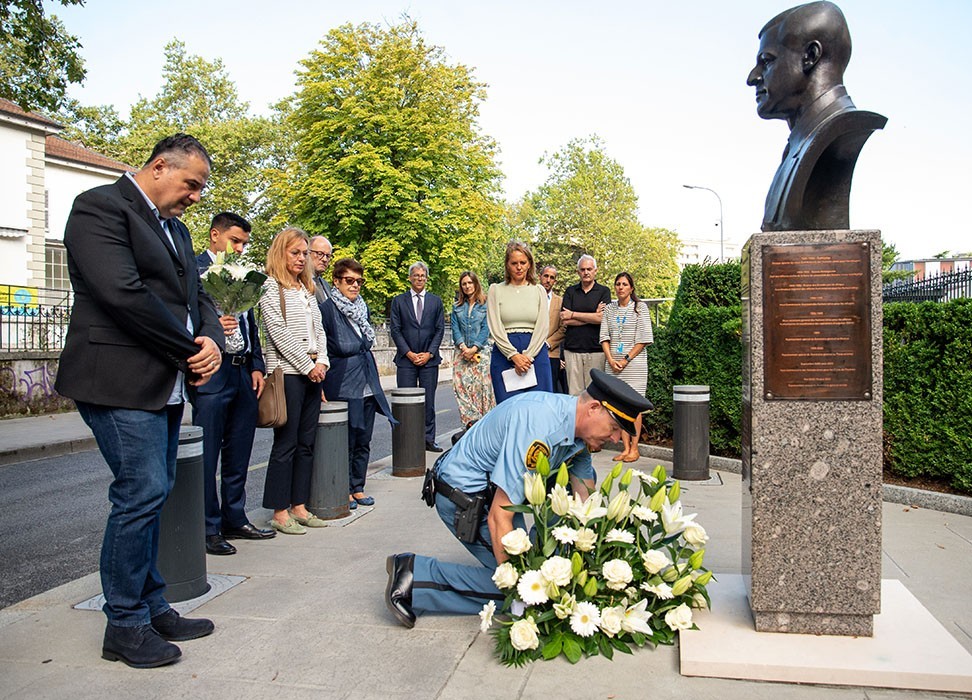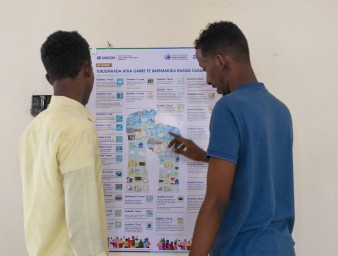Honouring humanitarian workers around the world
19 August 2024

Twenty-one years ago today, a bomb ripped through the United Nations headquarters in the Canal Hotel in Baghdad, Iraq, killing 22 staff members and injuring more than a hundred – a tragic day that left an indelible mark on the humanitarian community.
To remember the lives of all humanitarian workers lost around the world, colleagues, family and friends came together for a memorial ceremony at the UN Human Rights’ headquarters in Geneva, Switzerland, and issued an urgent appeal to guarantee the protection of humanitarians working under increasingly dangerous circumstances and demand accountability for violations of international humanitarian and human rights law.
World Humanitarian Day is observed every August 19 to honour humanitarians who work to promote the humanitarian cause and those who have lost their lives. The day is also an occasion to remember people affected by humanitarian crises all around the world.
During an intimate ceremony, the names of all the 22 colleagues killed in Baghdad were read out – as were the names of colleagues who lost their lives in Afghanistan, Haiti and Rwanda. Colleagues, family members and friends held a minute of silence, shared personal memories, and laid flowers by the memorial bust of Sergio Viera de Mello, then Secretary General’s Special Representative for Iraq, who died in the attack. For colleagues, the dedication of those who died while promoting humanitarian values is a source of inspiration in the quest for justice and human dignity.
“We are proud to stand in solidarity with our colleagues and all humanitarian workers. We recognize those who lost their lives, and we call on the international community for the immediate protection of civilians and humanitarian workers,” said Said Almadhoun, Human Rights Officer with the Emergency Response Section at the Humanitarian Action Unit.
The memorial was an occasion to shed a spotlight on colleagues working in a plethora of humanitarian tragedies around the world in increasingly dangerous conditions, as well as on civilian suffering and impunity.
2023 marked the deadliest year on record for humanitarian workers, with recurrent and deliberate attacks on aid workers, leading to deaths, injuries, detention, and kidnappings, including those of eight UN Human Rights colleagues who remain held incommunicado in Yemen.
In Afghanistan, Central African Republic, the Democratic Republic of Congo, Haiti, Gaza, Sudan, Ukraine, Venezuela and Yemen, to name some countries, human rights and humanitarian actors operate in extreme conditions with significant access constraints.
“
I consider myself privileged to have something to provide for the people who are really suffering.
“
AMINA ABU-SAFA, PROTECTION CLUSTER COORDINATION TEAM IN THE WEST BANK
“As we pay tribute to those who are no longer with us, I want to recognize the courage and dedication of all OHCHR colleagues to whom we are indebted, as they work tirelessly and passionately around the world,” Deputy High Commissioner for Human Rights Nada Al-Nashif said.
A global campaign is under way to mobilize Member States and non-state actors to ensure protection of humanitarians and civilians and accountability for violations of international humanitarian and human rights law. Last May, the UN Security Council adopted Resolution 2730 on the protection of humanitarian workers, condemning rising attacks on humanitarian workers and UN personnel.
With close to 60 wars and conflicts raging around the world with devastating consequences for lives and livelihoods, UN Human Rights is growing its engagement in humanitarian action and with humanitarian partners.
Last year, UN Human Rights Chief Volker Türk endorsed the Office’s strategy on humanitarian action, a critical pillar of work as crises are becoming more protracted and complex, with enhanced human rights impacts. The Office is pursuing several initiatives to better support staff, including to enhance duty of care and operational support.
Almadhoun said UN Human Rights colleagues working in humanitarian crises were helping to save lives, alleviate suffering and maintain human dignity.
“Complex crises require solutions and a shift from textbooks to finding solutions. We need to change and adapt our work modalities, adjust tools and practices to changing contexts at the critical time of crisis,” he said.
During the ceremony, a video interview was played of Connie Pedersen, Protection Cluster Coordinator of the Office of the United Nations High Commissioner for Human Rights in the occupied Palestinian territory. Pedersen explained the crucial role of the Protection Cluster, set up under the leadership of OHCHR to coordinate the protection activities of international and national humanitarian and human rights actors, and advocate human rights and international law in humanitarian action.



